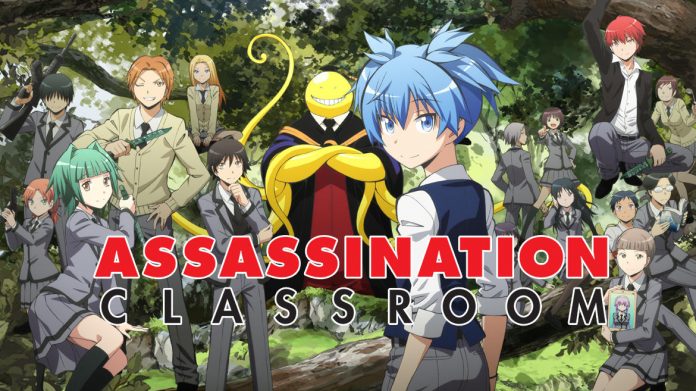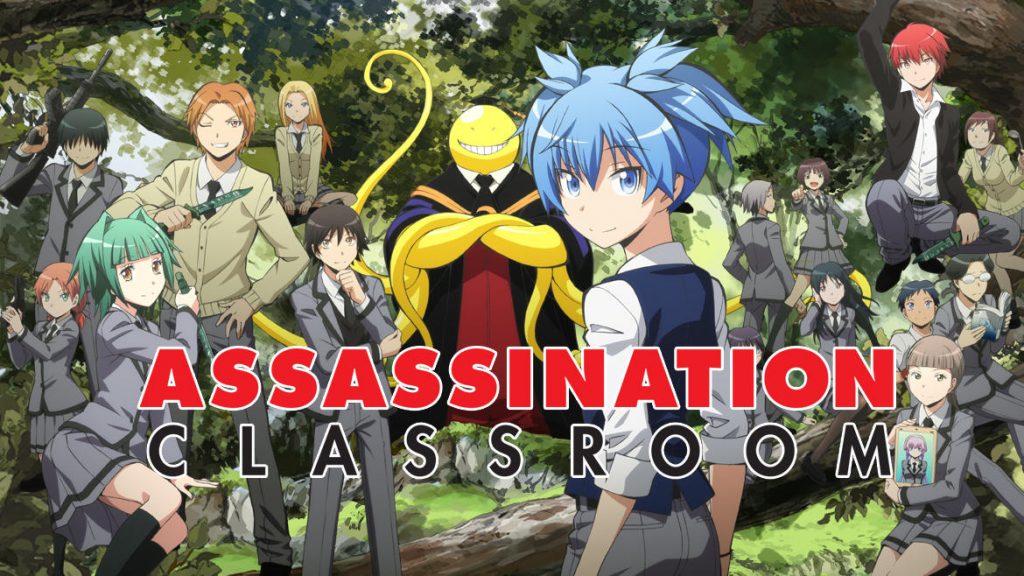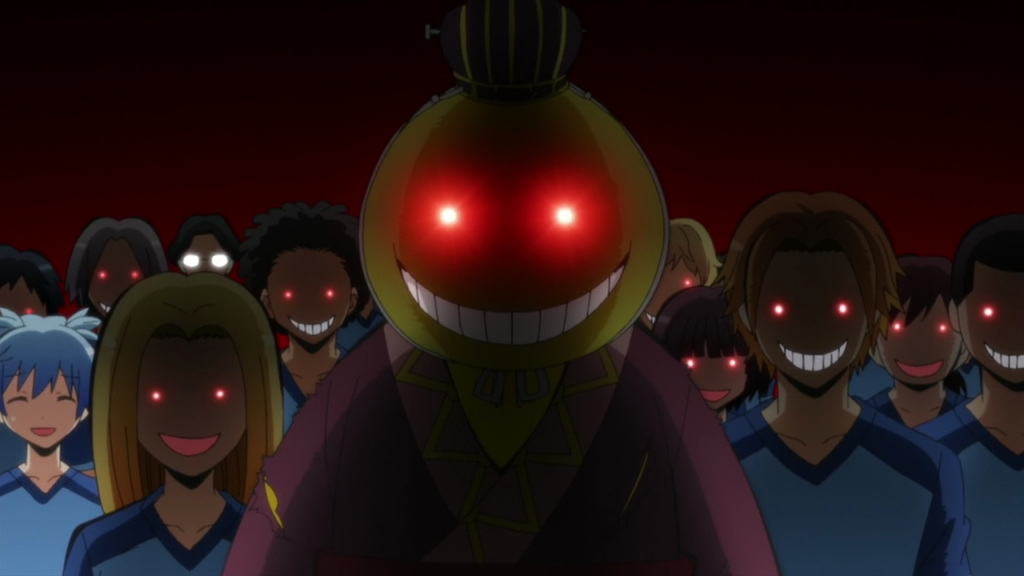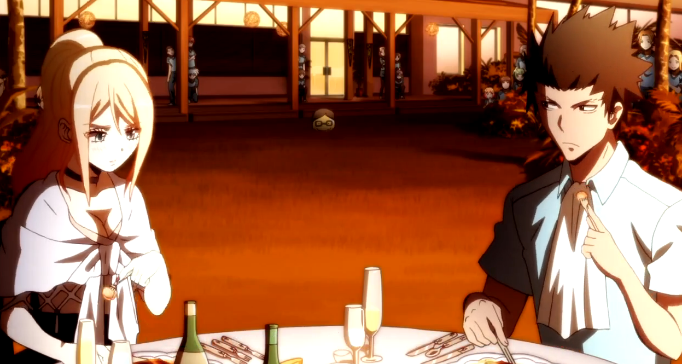One of the best anime series to come out of 2015 and 2016 was Assassination Classroom. I remember how excited fans were that the manga in Weekly Shonen Jump was going to be animated. What made things even more special was how the anime would follow the manga closely (enough) and finish how the manga did, a rare thing to occur with anime. It almost makes me sad how Assassination Classroom was only able to muster two full seasons, considering how popular it was. For those who might have been worried at how the second season would follow-up the first (which was awesome) let me end your worry here. The second season was just as fun as I remembered and I loved the fantastic job FUNimation did with the dub itself.
The thing that Assassination Classroom does well is balancing out its humor with its serious moments. The spots chosen to put in a gag were usually right on the mark and didn’t push the series to an unfavorable position when the more serious moments occurred. It didn’t make me feel conflicted about what kind of tone the series is trying to make (take notes Nanbaka). Just like school life, it can be both funny and serious, but it’s up to students to find a balance to reach their objectives, which is the overall message Assassination Classroom conveys. It didn’t turn into a series that added funny moments to try and get a cheap laugh, or severe moments that seek to make it edgier. The flow of comedy and darker tones were well placed, and that isn’t easy to accomplish.
Just like in real life, finding that balance of work in play becomes necessary. This is something I think Assassination Classroom shows, especially with the pressures that students all around the world face. School work and getting good grades is important, but there comes a time when it’s best to take a step back and relax. Assassination Classroom does a remarkable job of showing how stressed students can become with the strict regiments that can be implemented. Not to mention that it’s important to find a way to help teach every student in a classroom instead of just the students who are easily grasping the material. This idea helps Assassination Classroom spur the discussion on education, as to what is the best way to help younger generations learn and become ready in the world. After all the horror stories I hear about in Japan’s school culture (where the stress and anxiety about failing can cause students to commit suicide), this series does its best to show that there needs to be a more balanced and nurturing environment for some students to learn. Going at breakneck speed will show who is truly gifted and who will be discarded like trash. Some can handle the added pressure of cramming and crazily complicated problems better than others. But that shouldn’t be the only method of teaching, as some students might not be able to keep up, at least in my mind, as well as Koro-Sensei’s.
As far as the humor in Assassination Classroom, most of it was spot on for me, and I think many anime/manga fans will appreciate it. It was mostly gag humor, but it was the kind of humor that showed the personalities of the students of E-Class as well as Koro-Sensei. Plus, it was funny seeing all the nods to other Weekly Shonen Jump titles in these 13 episodes. I was surprised to see a Bobobo reference made when the students opened a food stall at their building (and of course the Food Wars reference as well). And the code name episode was hilarious, with the names the students picked out for each other. Given the large cast of E-Class, it was a tease for those who aren’t super fans of the franchise, who might remember each character, almost like the series was poking fun at itself in a way that made perfect sense.
The arcs for these 13 episodes also felt exciting. As we have progressed we start to learn more about Koro-Sensei’s past, which is something that was kept under wraps during the first season. The students want to know any and all information to help them kill them, but are also curious as to why Koro-Sensei is their teacher and why he plans to destroy the Earth by March. We don’t understand every episode, but we are getting close to finding out some pretty important information that will be in the second part of Season Two. Still, what we did have in the first part was engaging enough to keep fans interested. While it wasn’t focused on Koro-Sensei’s past, we do get to concentrate more on Nagisa (our main character), detailing his past and why he looks like a girl, and why he’s so meek and timid with others. But we also see Nagisa experience an internal struggle for what he wants to do in life. He finally asked the question of whether he should become an assassin, considering he has the talent for it. For the climax of this assortment of episodes, we see a theatrical battle between E-Class and “The Reaper” (best assassin in this franchise) which hits on what fans of the franchise enjoyed about the arrangement between the government and the school.
Sonny Strait continues to impress with his performance as the amazing teacher/assassin, Koro-Sensei. What I didn’t realize was that even though he didn’t have to worry about lip flaps like in most anime, it was just as difficult to figure out what kind of emotion to convey, since Koro-Sensei’s face doesn’t change. If it wasn’t for the teacher’s face changes (the green stripes, the pink, the black), we really couldn’t tell how the character is feeling. He could obviously see how his Japanese counterpart acted out each scene, which helped, but it was still pretty impressive (Sonny mentioned all this in the little short “The Many Faces of Koro-Sensei, which I found informative). Not to be outdone, Ian Sinclair was absolutely dynamite as “The Reaper” as he matched the cool, calm, collectiveness of the most efficient assassin, as well as the crazy outbursts that were needed. Both were huge standouts out of an overall impressive cast.
My only qualm when it comes to the cast is how both Principal Asano (Chris Rager) and Mr. Kurasama (Chris Ryan) sounded. There wasn’t anything extremely wrong with it, but for some reason they sounded stiff. I don’t feel the emotional turmoil you’d expect at the scene’s climactic finish, where Principal Asano and Koro-Sensei face off for what seems like the last time. Even leading up to it, when the Principal wanted to squash Koro-Sensei and E-Class, the way he sounded seemed to reach only mild annoyance instead of seething anger. Even when Principal Asano was plotting to take down E-Class by giving private lessons to students in other classes, the performance didn’t give off the vibe of an evil dictator, but of a guy with a lower voice doing a regular thing. The same can be said for Mr. Kurasama, although since he is a government employee it fits the build a little more. My issue is that since he’s been with E-Class for so long, I’d expect a bit more out of him, especially during his fight with “The Reaper” and the betrayal of Irina. It felt underwhelming, but again that’s just to my ears, and it didn’t hinder my enjoyment of the series.
More about the character of Professor Asano. I didn’t like the whole backstory explanation as to why he teaches the way he does. The series tries to make him seem more sympathetic, especially since one of his first students’ was bullied to the point of committing suicide. But I felt as if that story was included for overall convenience to try and make him more human and to give him a reason why he developed his cutthroat teaching system. His methods were oppressive, and it’s tough to try and turn things around and make that character likable, especially considering the kind of antagonist he was throughout the entire series. It would have been better to keep the status quo and make him stay a pure evil character, as this whole story line felt forced.
I also wish the arc where their kids accidentally hurt an old man was played out a little more. It was one of my favorite arcs in the manga because of the lesson it taught the characters and readers. They had become powerful both in mind and body, and their thinking that they can use that power however they please became dangerous. Thinking that they are invincible (which kids typically believe they are) was all too easy for anyone to understand. The anime (which doesn’t have the luxury of explaining every little detail) quickly went through this whole arc more than I would have liked (I also wish they were wearing the combat suits as they did in the manga, instead of just going to school in their regular uniforms).
Overall, I remembered why I enjoyed watching this “simuldub” when it was released on FUNimation’s streaming service. It provides such a good mix of both humor and seriousness that felt like I was looking at a complete show. Even the opening song “Question” gave me chills (again) and watching it made this release the complete package. If you decide to buy it, it comes in a standard Blu-ray case with a hard slipcover and comes with a video called “The Many Faces of Koro-Sensei,” which was both cute and informative. Assassination Classroom falls into a category that I think even non-anime fans would enjoy, despite the teacher being an octopus and being a bit pervy, because of the lessons it teaches and the topics people might discuss after watching it. I’m pleased, and cannot wait to review the stunning conclusion when the time comes.
Score 9/10
Pros: Teaches valuable lessons about life and school; learning more about Nagisa; solid humor and serious moments; the opening.




